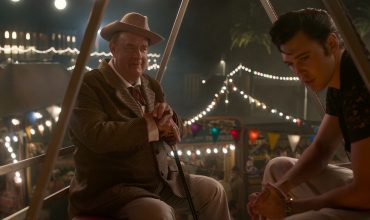In an interview with Stephen Colbert, Belfast Boy Kenneth Branagh speaks on the origins of his new, uncreatively-named film – an autobiographical account of his own childhood in the capital of Northern Ireland during The Troubles. His was a time of great change when the village he resided in was thrown into violence and turmoil in 1969 from fighting between Protestants and Catholics (or Unionists and Nationalists). But much like the parallel of a formerly Protestant Branagh explaining his upbringing to devout Catholic Colbert, this was never really about religion. As Branagh puts it, his three obsessions as a child were “football, a girl called Catherine and movies”. What follows in Belfast is a surprisingly uplifting and tonally balanced recollection of growing up in conflict that’ll leave you wondering “just how many songs does Van Morrison have?”
Belfast opens the way Wizard of Oz doesn’t – in the jewel-toned colours of the present-day city. We take a peek over a Peace Wall and wind up in a monochromatic fantasy of the late 60s, weaving through streets full of children whose rearing required the entire village. Branagh sees his past in black and white but not to be restrictive – “colour describes people – black and white allows you to feel people” – and we focus on the textures and our protagonist’s gorgeously bucked teeth more fervently. Branagh’s stand-in, Buddy (newcomer Jude Hill), is a 9 year old lad whose biggest problem is the hierarchical seating arrangement in his classroom. The object of his desire, Catherine, is a high-key genius and Buddy must either hit the books to earn the seat next to her or die trying. Meanwhile, tensions are rising between ‘bad guy’ Billy Clanton (Colin Morgan) and every Catholic on the street.
Buddy is a Protestant but he’s got about as much understanding of the word as I do. His Pa (Jamie Dornan) is Irish FIFO and his Ma (Caitríona Balfe) worries about their debts. Older brother Will (Lewis McAskie) is very much on the periphery – uncharacteristic of an eldest child, but this first-born senses wish-fulfilment in Sir Kenneth. They live with their charming grandparents; Pop (Ciarán Hinds) and Granny (everyone’s favourite Dame) offer words of wisdom and silliness from their own marriage of 50 years to the budding Casanova and Buddy absorbs them like a sponge. As the violence outside bleeds into the family’s street, Pa entertains the idea of uprooting their modestly idyllic life and settling somewhere sunny with a suggestive brochure for Sydney. Ma is reluctant (and possibly expecting), and a decision must be made. The family dynamic in this film strikes a chord, especially for someone whose own grandparents left a rainy country for Australia after seeing an advert in the newspaper. But the Browns of Devon never faced true danger like the household in this film and breaking it to the baby of the family is as gut wrenching for the audience as it is for his parents.
And the reason for this lies on the jaunty shoulders of Jude Hill. One can imagine that Branagh was a spirited and precocious young thing – especially as a middle child, naturally predestined to lose out on attention – so his portrayer needed to have it. Hill has it in droves, carrying each scene with his adorably thick accent and the assured words of all great protagonists with youth on their side. Branagh recalls that Hill spent the first two days of shooting looking at the camera, an exhibitionist in the making. But it didn’t take long for him to refocus his efforts on Dame Judi, for as Branagh imparted on him, “she’s ever so interesting”. For a young actor in his film debut (directed by someone with a penchant for theatre adaptations), facing up against the likes of Judi Dench and Ciarán Hinds is wildly impressive.
Branagh tells Colbert that it was 2020’s state of everlasting lockdown that forced him to finally think back on and process his feelings about his childhood upheaval. A reminder of his introduction to being locked down, he vividly remembers hearing a swarm of bees and realising his mistake as a crowd of rioters came up his street and started smashing the windows of the shops he frequented. One such moment is curiously played for comedy in the film as Buddy is roped into looting a deli with his older cousin (who is part of Billy Clanton’s gang of militant Protestants) and steals something so crap he considers taking it back. “I don’t even like Turkish Delight” he laments – “no one does” his cousin quips, voicing what we all thought as kids sticking our hands into a box of Favourites and not getting the good choccies. Levity in the face of danger is an essential worker in all good coming-of-age stories, and Belfast captures it beautifully. It’s a sweetness conveyed in the music that scores the events, from an artist who shares an origin story.
Almost the entire soundtrack of Belfast is made up of Van Morrison’s discography, from a time when his songs evoked a sense of triumph and play, prior to his more recent reputation of being an accomplished curmudgeon. “Bright Side of the Road” cheerily highlights Buddy’s luck in being a Protestant in a mostly-Protestant street, while “Jackie Wilson Said” scores (very) young love beautifully. Themes from High Noon make the correlating stand-off between Pa and Billy Clanton wondrous in a child’s eyes and dangerous in anyone else’s, and we watch and grin as colourised images reflect in Buddy’s eyes as he and his family see Chitty Chitty Bang Bang at the cinema, singing along in elation. The dreamlike “Everlasting Love” sequence will make Dornan the object of Fifty Shades fans’ fantasies all over again but for us sane folk, it’s a sweetly solemn ode to grabbing what’s important from your home and getting out of Dodge.
I grinned an awful lot watching Belfast and whether it was the familiar feeling of that last leg of childhood or the fact that I ate an entire bag of Twisties throughout to prolong putting my mask back on, it’s a film that many will connect with. Some may critique the sentimentality and lack of emphasis on the direness of The Troubles, but remember that we’re viewing the events through the eyes of a wonderfully spirited child – shades of grey and all. I saw Belfast at a media screening and while I was disappointed in the serving of champagne over Jameson, I felt a sobering sense of gratitude that our biggest problem at the moment is having to wear masks at the movies. 8/10
Belfast is in cinemas Feb 3rd.


